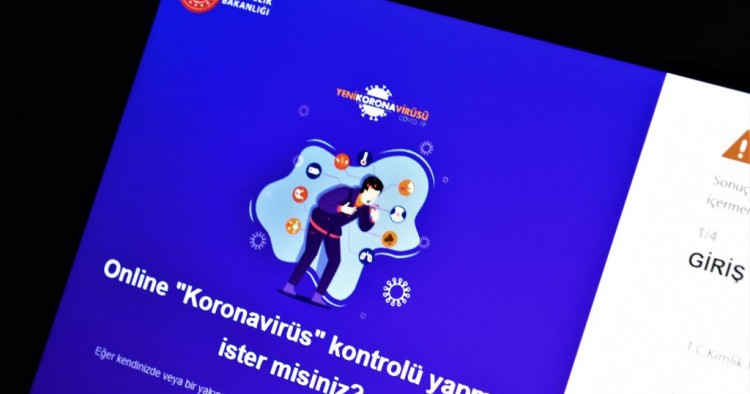The spread of the novel coronavirus and its rippling effects on MENA economies and societies have had critical implications for safety and freedom in the cyber domain, broadly defined. From a security perspective, bad actors in cyberspace, both state-backed and independent, have taken the opportunity of a distracted and internet-dependent international community to continue escalating unique cyber attacks and threats. Government-backed hackers in Iran, for example, have been targeting victims in the region and beyond with coronavirus-themed or titled messaging as a way to spread spyware, while others have taken advantage of a desire for reputable public information about the spread of the virus to increase attacks over email and messaging platforms. Such messages have claimed to include tracking tools or World Health Organization-backed information about public safety, while in reality containing malicious ransomware.
From an information security perspective, the danger of disinformation relating to the virus remains potent, and continues to present a persistent threat, particularly to internet and social media users in non-English languages like Arabic, Persian, and Pashto, where verification and policing of outright myths and disinformation is more difficult and costly. One such example is a weaponized hashtag on Twitter being spread by a variety of botnets and state-linked accounts in the Gulf, pushing the narrative that Qatar is responsible for the spread of the disease in that region. It remains likely that other states in the region will continue to utilize disinformation and misinformation campaigns as a means to push particular political ends, or to sow general discord and confusion, following the example of Russia and China.
Both of these larger themes have continued to raise new questions about the role of the internet and technology in the Middle East as a means to facilitate — or corrode — freedom of expression, civil liberties, and public safety. States throughout the region and elsewhere have continued to consider the role of advanced tracking and surveillance tools as a way to monitor and control the spread of the virus, raising concerns among privacy advocates, who have pointed out that state use of such tools has the potential to threaten freedom of movement and expression. The Israeli NSO Group, for example, which sells a variety of controversial spyware and tracking tools, has reportedly worked with Israel and several other states to pilot software aimed at tracking infected and potentially-infected individuals. As states in the region work to defend public safety while grappling with questions of privacy and political expression, it will be critical to watch closely how the COVID-19 epidemic will continue to ramp up this tension.
Eliza Campbell is the Associate Director of the Cyber Program.
Photo by Altan Gocher/Barcroft Media via Getty Images
انتشار فيروس كورونا يطرح أسئلة جديدة حول دور التكنولوجيا
إليزا كامبل
رتب انتشار فيروس كورونا في الشرق الأوسط وتداعياته المتتابعة، اجتماعيا واقتصاديا، آثارا شديدة الأهمية وواسعة النطاق، على الأمان والحرية في الفضاء الإلكتروني. وبخلفيات أمنية، اغتنمت الجهات السيئة، سواء منها المستقلة أو تلك التي تدعمها دول معينة، فرصة تشتت انتباه المجتمع الدولي المعتمد على الإنترنت بشكل كبير، لتصعيد التهديد الإلكتروني وتكثيف هجماتها. ويستهدف قراصنة مدعومون من إيران ضحاياهم، في المنطقة وخارجها، من خلال رسائل، بعناوين متعلقة بفيروس كورونا، لنشر برامج للتجسس. في الوقت نفسه يستغل قراصنة آخرون رغبة الجمهور بالحصول على أخبار تتعلق بانتشار الفيروس لزيادة هجماتهم على صناديق البريد الإلكتروني للمستخدمين. وتزعم بعض هذه الرسائل أنها تتضمن معلومات حول الوقاية من الفيروس، مدعومة من منظمة الصحة العالمية، فيما هي في الواقع تحوي برامج للابتزاز الخبيث ( Malicious Ransomware ).
من منظور الأمن الإلكتروني، ما زال خطر التضليل المرتبط بانتشار الفيروس قويا، ويشكل تهديدا ماثلا، خصوصا لمستخدمي الإنترنت ووسائل التواصل الاجتماعي بلغات غير الإنكليزية، مثل العربية والفارسية والبشتونية، حيث تكون وسائل التحقق من صحة مصادر الرسائل والمعلومات مكلفة ومعقدة في الوقت نفسه. وأحد الأمثلة على هذا التضليل شيوع هاشتاغ على تويتر نشرته مجموعة من الروبوتات والحسابات المرتبطة بدولة خليجية، يزعم أن دولة قطر هي المسؤولة عن انتشار المرض في تلك المنطقة. ومن الواضح أن دولا أخرى في المنطقة لجأت، أو قد تلجأ، إلى استخدام حملات التضليل كوسيلة لتحقيق أهداف سياسية معنية، أو بث الفرقة والخلاف ونشر الارتباك في دول أخرى، على غرار ما دأبت روسيا والصين على القيام به.
هذه المسائل الكبرى تثير أسئلة جديدة حول دور الإنترنت والتكنولوجيا في الشرق الأوسط، وما إذا كانت وسيلة لتعميم حرية التعبير وصون الحريات المدنية والحفاظ على السلامة العامة، أم هي وسيلة لتآكل هذه القيم وضمورها. ومؤخرا قامت دول كثيرة في المنطقة وفي أنحاء أخرى من العالم، في تفعيل أدوات التتبع والمراقبة كوسيلة فاعلة لرصد ومراقبة انتشار عدوى فيروس كورونا. مما أثار مخاوف كبيرة لدى دعاة المحافظة على الخصوصية، الذين ادعوا ان استخدام أجهزة الدولة لهذه التقنيات قد يؤدي إلى تهديد حرية الحركة والتعبير. وعلى سبيل المثال لا الحصر، قامت الشركة الإسرائيلية (NSO) للبرمجة الإلكترونية، والتي تنتج برامج متنوعة تختص بتقنيات التتبع والملاحقة والتجسس، بتجربة برنامج لتتبع الأفراد المصابين بفيروس كورونا لحساب الحكومة الإسرائيلية ودول أخرى في المنطقة.
هناك جهد كبير تقوم به حكومات المنطقة للمحافظة على السلامة العامة. لكن بعض الوسائل التي تعتمدها لتحقيق هذه الغاية، يتعارض مع خصوصية الأفراد وحرية التعبير السياسي، ومن الأهمية بمكان مراقبة مسار التصدي لفيروس كورونا وما يفتحه هذا المسار من احتمالات لتصعيد التوتر بخصوص هذه القضايا الآنف ذكرها.
The Middle East Institute (MEI) is an independent, non-partisan, non-for-profit, educational organization. It does not engage in advocacy and its scholars’ opinions are their own. MEI welcomes financial donations, but retains sole editorial control over its work and its publications reflect only the authors’ views. For a listing of MEI donors, please click here.













